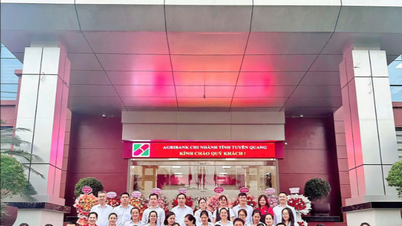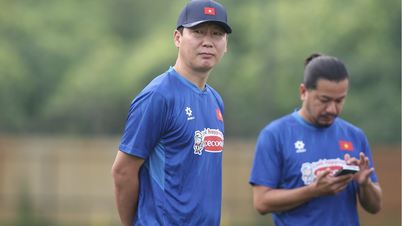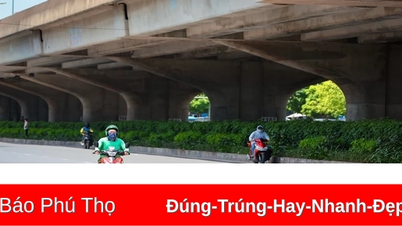Recently, the situation of officials avoiding work and responsibilities has been quite common in many sectors and fields, seriously affecting the country's socio -economy and causing resentment in society.
Although the Party and State leaders have given strong directions to overcome the situation, the above situation has not yet ended. Therefore, more drastic solutions are needed to change the awareness and attitude of cadres and party members in performing their assigned duties and tasks, and at the same time, resolutely replace irresponsible cadres who do not meet the requirements of the task.
The danger of the perception "if you don't do it, you can't do it wrong"
The phenomenon of officials being afraid of making mistakes, afraid of responsibility, and not daring to perform public duties is not an isolated phenomenon but occurs in many localities, including some central ministries and branches. The fear of making mistakes is clearly reflected in the disbursement of public investment capital, land and real estate management, procurement of public equipment, and provision of services directly related to people and businesses, as reported by the press.
The fear of making mistakes from sensitive areas shows signs of spreading to many areas, even causing work avoidance and officials not wanting to sign any documents.

Illustration photo: dangcongsan.vn
In particular, during the job rotation process, cadres show signs of being afraid of work, being defensive, avoiding mistakes, and waiting for the rotation period to end. Some units reported that they were very frustrated with a cadre in this category, because any document submitted would be asked back by this cadre: "Do I have the authority to sign?", then the document would be kept for research, causing work congestion, even though the above documents were completely within the authority and in accordance with regular practice.
This causes stagnation and delay in the civil service, erodes and reduces people's trust, affects all aspects of the socio-economy; hinders resources and development motivation, especially in the current difficult situation.
It is worrying that there is a common way of thinking among cadres and civil servants that "if you don't do it, you can't do it wrong". This is a sign of "self-evolution" in the political ideology of cadres and civil servants, seriously hindering the completion of tasks of agencies, units and the overall development of the country.
Speaking at the National Assembly , National Assembly delegate Nguyen Huu Thong said that there is a state of insecurity, fear of mistakes, and fear of responsibility among a number of cadres, civil servants, and public employees. Some cadres confided that "they would rather stand before a disciplinary council than stand before a trial council."
In fact, this ideological development shows that the cadres, civil servants, and public employees are separating disciplinary violations from violations of the law. They believe that violations of public service discipline are subject to party discipline (with the following forms: reprimand, warning, dismissal, expulsion), administrative discipline with the following forms: reprimand, warning, dismissal, dismissal (for cadres), or reprimand, warning, salary reduction, forced resignation (for civil servants not holding leadership or management positions), or reprimand, warning, demotion, dismissal, forced resignation (for civil servants holding leadership or management positions). However, if they violate the law, cadres and civil servants may be subject to criminal penalties, possibly imprisonment.
According to Minister of Home Affairs Pham Thi Thanh Tra, there are four basic groups of causes leading to the fear of making mistakes, including limited professional capacity of cadres and civil servants; leaders of some units have not set a serious example; socio-economic institutions are still inadequate, overlapping or have new problems arising in practice but have not been promptly corrected.
The fight against corruption is being promoted, many officials and civil servants who have committed serious violations have been disciplined and prosecuted, leading to a group of people being afraid of making mistakes. Looking at it from a political and ideological perspective, comrade Pham Thi Thanh Tra emphasized that, regardless of the reason, if officials are afraid of making mistakes and do not dare to do things, they are violating regulations and showing signs of degradation. They need to be severely criticized and there must be solutions to eliminate this negative phenomenon.
Blaming the fear of breaking the law to avoid work and shirk responsibility is just an excuse, because in reality, with the same legal regulations and mechanisms, some localities still do well in public investment, economic growth, business development, and officials are still dynamic, creative, dare to do and do well. Therefore, it is impossible to completely blame the entanglement in regulations and mechanisms for not performing public duties.
Tricks to procrastinate at work
From a legal perspective, Comrade Le Thanh Van, Standing Member of the National Assembly's Finance and Budget Committee, said that doing nothing is a violation of the law because it does not fulfill the duties and obligations assigned by the State. This is irresponsible and a violation of the law, and must be dealt with.
However, when studying current legal regulations, there are no specific regulations to handle officials and civil servants who avoid work. There are only regulations to handle officials who do not comply with working hours, take leave without proper regulations, do personal work during office hours... When officials and civil servants are still at the office according to regulations, it is not easy to handle when the work is not completed.
Recently, there has been a rather "sluggish" behavior in the performance of public duties, which is to send documents to superiors and industry management agencies, although according to the law, those agencies and localities have the authority to decide, handle the work and take responsibility. When the industry management agency receives the document, it responds very generally: "Please implement in accordance with the law."
Thus, the "ball" of responsibility is being kicked back and forth between agencies, ministries, branches, and localities. Work is stalled, the damage is huge, but no one seems to be held responsible. Because in reality, it is not easy to handle and discipline an official who does not advise or sign a decision and is found to have violated the law. When work is not yet clear, officials often explain that there is not enough legal basis to resolve it, and sending unnecessary circular documents is also explained as the process of performing tasks, and it is not easy to find fault.
Assign tasks, targets, clear deadlines and replace staff
To solve the current situation of procrastination, work avoidance, and responsibility avoidance among officials and civil servants, we should study and implement the following solutions:
First of all, it is necessary to improve the quality and actual effectiveness of personnel work. It is necessary to select cadres who are virtuous, talented, knowledgeable, experienced, and courageous, who dare to do and take responsibility, and to assign important tasks. To do so, it is necessary to properly implement the Party's regulations on controlling power in personnel work and against the abuse of power and positions. Only when personnel work is clean will the Party be strong, the organization will be strong, work will be smooth, and the country will develop.
Second, it is necessary to regularly review and amend laws and regulations that are not suitable to reality, so that the laws are highly feasible and avoid risks for cadres and civil servants when performing their duties.
Third, it is necessary to assign responsibility to the leader. Selecting good cadres must also have methods and regulations to properly evaluate the quality of the cadres' task completion. A good cadre but assigned to an inappropriate job position can also affect the quality of the cadre's task completion. If the cadre holds a leading position, it will affect the quality of the agency's or unit's work.
Therefore, it is necessary to assign tasks and targets to agencies, units and to the cadres in charge of those agencies and units clearly. If the targets are not met, it is necessary to consider transferring that cadre to another position, choosing someone more suitable. Assigning targets and assigning responsibility for completing tasks to the heads of ministries, branches, localities, agencies and units has a great effect on urging work to run smoothly.
General Secretary Nguyen Phu Trong has given a very strong directive: "Those who do not dare to do it should boldly stand aside and let others do it", clearly showing his attitude towards cadres who are sluggish, afraid of responsibility, and avoid work. Therefore, units and localities that are often reported to be sluggish and show signs of avoiding responsibility need to consider the responsibility of the leader and have appropriate alternative solutions. We must break down and completely change the concept of "not doing is not wrong" among cadres and party members. Cadres and party members must see that: If not doing something causes serious consequences, they will be held responsible and punished.
Fourthly, for cadres in the planning and rotation, it is necessary to carefully consider the quality of completing tasks in the rotation position. There should not be a "sitting still" mentality among a part of cadres in the planning and rotation for testing. This rotation period is an opportunity for cadres to clearly demonstrate their capacity and enthusiasm for contribution, from which the organization can arrange cadres according to the planning.
Fifth, it is necessary to develop and apply tools to accurately and scientifically quantify and evaluate the quality of task completion of cadres and civil servants. Currently, the work of evaluating cadres is still subjective, and there are no tools to effectively measure the quality of task completion. In places where work is blocked or delayed, cadres can still be assessed as having completed their tasks well.
In developed countries, there are many tools to measure the performance of human resources, for example, the KPI index that many businesses in Vietnam have applied quite effectively. This index has a common standard, based on which each agency, unit, and business will build and adjust to suit the characteristics of its field. However, in order to evaluate the performance of the staff and civil servants, the targets, tasks, and completion deadlines assigned to ministries, branches, and localities must also be very specific and clear.
Sixth, there needs to be a mechanism and policy to encourage and protect cadres with the spirit of "7 dares: Dare to think, dare to speak, dare to do, dare to take responsibility, dare to innovate, be creative, dare to face difficulties and challenges, and dare to act for the common good". Currently, there is Conclusion No. 14-KL/TW, dated September 22, 2021 of the Politburo (13th tenure) on the policy of encouraging and protecting dynamic and creative cadres for the common good. However, Conclusion No. 14-KL/TW needs to be institutionalized into specific legal regulations, from which cadres have a basis to be confident when performing their tasks for the common good.
Seventh, for individual cadres and party members, they must constantly cultivate and train their mettle, revolutionary ethics, capacity and qualifications. When cadres and party members clearly see their duties and responsibilities, they will always be steadfast in the face of difficulties and challenges and will not be tempted by material things, money and fame.
At the same time, revolutionary ethics will motivate cadres and party members to be enthusiastic in carrying out their tasks, unable to turn a blind eye to a mountain of work, unable to ignore the expectations and trust of the organization, society and people. The mettle of a cadre is demonstrated in the will to overcome difficulties and hardships, resilience, courage, daring to think, daring to speak, daring to do, daring to take responsibility, daring to innovate, be creative, daring to face difficulties and challenges, daring to act for the common good.
Along with that, cadres and party members must constantly study to improve their qualifications, capacity, and accumulate practical experience to meet the requirements of the task. Cadres with qualifications, capacity, and practical experience will create trust and a solid foundation for cadres and employees under their authority, making cadres and employees under their authority not doubt or waver before their decisions. From there, organizations, agencies, and units always have a lively and confident atmosphere in all activities.
When the above factors are fully accumulated, the cadre will always promote the spirit of "7 dares", not be afraid of responsibility, not avoid or shirk responsibility.
Ta Ngoc (According to qdnd.vn)
Source







































































































Comment (0)